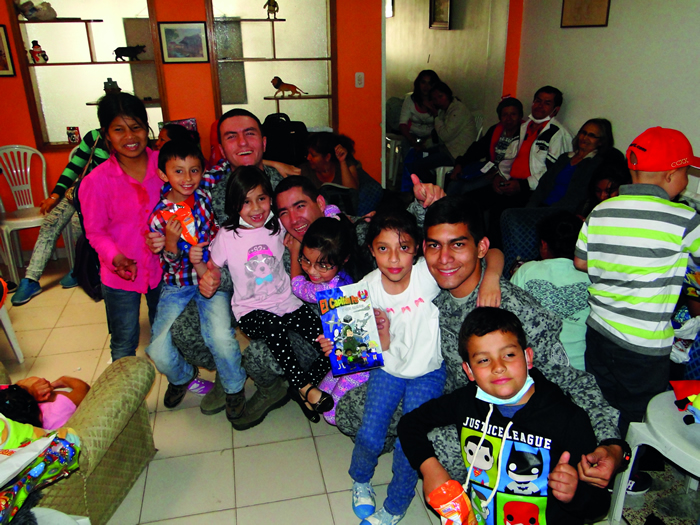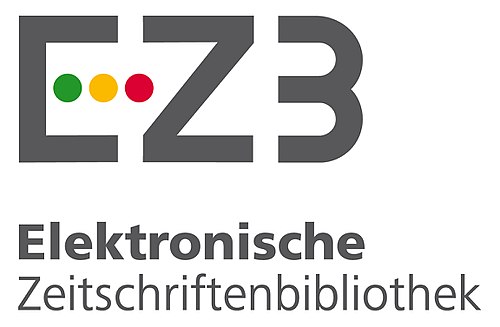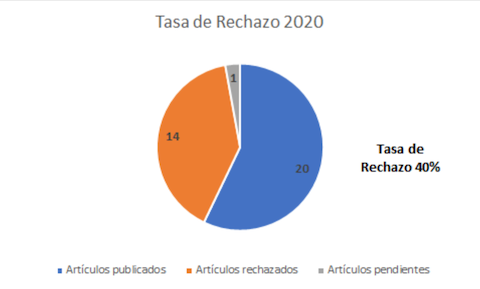Social competence in children and adolescents in the city of Bucaramanga ( Colombia ) as Messy scale
DOI:
https://doi.org/10.18667/cienciaypoderaereo.425Keywords:
Social Competence, Children, Adolescents, Messy ScaleAbstract
Many of the problems of violence and intolerance are associated with a deficit of mechanisms that allow the individual to function effectively, and therefore are trying to find tools of social relevance to define the factors that shape these behaviors in order to develop methodologies to develop techniques geared towards assertive skills that reinforce these individual characteristics in each subject. This is why this research focused on identifying the components of social competence with which children and adolescents have Bucaramanga and relationship with demographic characteristics (age, education, socioeconomic status). A quantitative study, cross-sectional correlational raised. The sample was for convenience, with a total of 330 participants aged between 8 and 17 years. Messy scale the applied and analysis of results was carried out by SPSS. The results show that you can’t define a direct relationship between social skills possessed by an individual and sociodemographic data, corroborating the influence of other factors in multivariate development.
Downloads
References
Alberti y Emmos (1978). Teoría de la evaluación y entrenamiento de las habilidades sociales. Valencia: Promolibro.
Brussino, S. A. (2002). Análisis causal del comportamiento agresivo infantil: pautas de crianza, estilo atribucional, capacidad intelectual y habilidad social. Tesis no publicada para optar al grado de Doctor en Psicología, Universidad Nacional de Córdoba, Argentina.
Caballo, V. (1997). Manual de Evaluación y Entrenamiento de las Habilidades Sociales. Madrid: Siglo Veintiuno de España Editores, SA 224
Cavell, T. A. y Kelley, M. L. (1994). The Checklist of Adolescent Problem Situations. Journal of Clinical Child Psychology, 23, 226-238.
https://doi.org/10.1207/s15374424jccp2303_1
Cavell, T.A. (1990). Social adjustment, social performance and social skills: A Tri-Component Model of social competence. Journal of Clinical Child Psychology, 19,111- 122.
https://doi.org/10.1207/s15374424jccp1902_2
Chou, K. L. (1997). The Matson Evaluation of Social Skills with Youngsters: Reliability and validity of a Chinese translation. Personality and Individual Differences, 22, 123-125.
https://doi.org/10.1016/S0191-8869(96)00166-3
Connolly, J. (1989). Social self-efficacy in adolescence: Relations with self concept, social adjustment, and mental health. Canadian Journal of Behavioral Science, 21, 258- 269.
https://doi.org/10.1037/h0079809
Cummings, K. D., Kaminski, R. A. & Merrell, K. W. (2008). Advances in the assessment of social competence: Finding from a preliminary investigation of a general outcome measure for social behavior. Psychology in the Schools, 45, 930-946.
https://doi.org/10.1002/pits.20343
Davis, M., McKay, M. y Eshelman, E.R. (1982). Técnicas de autocontrol emocional. Barcelona: Martínez Roca.
Elliot, S.N., Sheridan, S.M. y Gresham, F.M. (1989). Assessing and treating social skills deficits: A case study for the scientist-practitioner. Journal of School Psychology, 27, 197- 222.
https://doi.org/10.1016/0022-4405(89)90007-1
Essau, C. A., Conradt, J. y Petermann, F. (1999). Frequency and comorbidity of social phobia and social fears in adolescents. Behaviour Research and Therapy, 37, 831-843.
https://doi.org/10.1016/S0005-7967(98)00179-X
Farrell, A. D., Ampy, L. A. y Meyer, A. L. (1998). Identification and assessment of problematic interpersonal situations for urban adolescents. Journal of Clinical Child Psychology, 27, 293-305.
https://doi.org/10.1207/s15374424jccp2703_6
Foster, S. L., Inderbitzen, H. M. y Nangle, D. W. (1993). Assessing acceptance and social skills with peers in childhood. Behavior Modification, 17, 255-286.
https://doi.org/10.1177/01454455930173003
Furnhamn, A. y Gunter, B. (1983). Gender and personality differences in self-reported social skills among British adolescents. Journal of Adolescence, 6, 57-69.
https://doi.org/10.1016/S0140-1971(83)80056-6
Furnhamn, A. (1984). Personality, social skills, anomie and delinquency: A self-report study of a group of normal non-delinquent adolescents. Journal of Child Psychology and Psychiatry, 25, 409-420.
https://doi.org/10.1111/j.1469-7610.1984.tb00160.x
Godoy, A., Gavino, A., Martorell, M. C. y Silva, F. (1993). Assertiveness Scale for Children and Adolescents En M. Forns and M. T. Anguera (Eds.), Recent contributions to psychological assessment (pp. 247-264). Barcelona: PPU.
Gresham, F. M. y Elliot, S. N. (1984). Assessment and classification of children's social skills: A review of methods and issues. School Psychology Review, 13, 292-301.
Gresham, F. M., Sugai, G. y Horner, R. H. (2001). Interpreting outcomes of social skills training for students with high-incidence disabilities. Exceptional Children, 67, 331-344
https://doi.org/10.1177/001440290106700303
Gresham, F.M. y Cavell, T.A. (1986). Assessing adolescent social skills. En R.G. Harrington (Ed.). Testing adolescents: A reference guide for comprehensive psychological assessments (pp.93-123). Kansas City: Test Corporation of America.
Hops, H. y Greenwood, C. R. (1988). Social skills dificits. In E. J. Mash y L. G. Terdal (Eds.). Behavioral assessment of childhood disorders (pp. 263-314). New York: Guildford Press.
Inderbitzen, H. M., Walters, K. S. y Bukowski, A L (1997). The role of social anxiety in adolescent peer relations: Differences among sociometric status groups and rejected subgroups. Journal of Clinical Child Psychology, 26, 338-348.
https://doi.org/10.1207/s15374424jccp2604_2
Inderbitzen, H. y Foster, S. L. (1992). The Teenage Inventory of Social Skills: Development, Reliability, and Validity. Psychological Assessment, 4, 451-459.
https://doi.org/10.1037/1040-3590.4.4.451
La Greca, A. M. y López, N. (1998). Social anxiety among adolescents: Linkages with peer relations and friendships. Journal of Abnormal Child Psychology, 26, 83-94.
https://doi.org/10.1023/A:1022684520514
Ledingham, J.E., y Younger, A.J. (1985). The influence of the evaluator on assessment
of children's social skills. En B.H. Schneider, K.H. Rubin, y J.E. Ledingham (Eds.), Children's Peer Relations: Issues in Assessment and Intervention (pp.111-124). New York: Springer-Verlag.
Matson, J. L. y Wilkins, J. (2009). Psychometric testing methods for children's social skills. Research in Developmental Disabilities: A Multidisciplinary Journal, 30, 249-274.
https://doi.org/10.1016/j.ridd.2008.04.002
Matson, J.L., y Ollendick, T.H. (1988). Enhancing children's social skills. New York: Pergamon Press.
Matson, J.L.; Rotatori, A.F., y Helsel, W.J. (1983). Development of a rating scale to measure social skills in children: the Matson Evaluation of Social Skills with Youngsters (MESSY). Behavior Research Therapy, 21(49), 335-340.
https://doi.org/10.1016/0005-7967(83)90001-3
Mayseless, O., Wiseman, H., y Hai, I. (1998). Adolescents' relationships with father, mother, and same-gender friend. Journal of Adolescent Research, 13, 101-123.
https://doi.org/10.1177/0743554898131006
McConnell, R.S., y Odom, S.L. (1986). Sociometrics: Peer referenced measures and the assessment of social competence. En P. S. Strain, M. J. Guralnick, y H. H. Walker (Eds.), Children's Social Behavior (pp. 215-284). New York: Academic Press.
https://doi.org/10.1016/B978-0-12-673455-3.50010-5
Meichenbaum, D., Butler, L. y Gruson, L. (1981). Towards a conceptual model of social competence. En J.D. Wine y M.D. Smye (Eds.), Social competence (pp. 36-59). Nueva York: The Guilford Press.
Méndez, F., Hidalgo, M. y Inglés, C. (2002). The Matson Evaluation of Social Skills with Youngsters. Psychometric properties of the Spanish translation in the adolescent population. European Journal of Psychological Assessment, 18, 30-42.
https://doi.org/10.1027//1015-5759.18.1.30
Merrell, K.W. y Gimpel, G.A. (1998). Social skills of children and adolescents: Conceptualization, assessment, treatment. Mahwah, NJ: Lawrence Erlbaum Associates.
Muñoz, A., Trianes, M.V., Jiménez, M., Sánchez, A., y García, B. (1996). La Escala de Observación para Profesores: Evolución y forma actual. En M. Marin y F.Medina (Comp.), Psicología del Desarrollo y de la Educación: La intervención educativa (pp. 565- 573). Sevilla: Eudema.
Pereira Del Prette, Z. A. y Del Prette, A. (2002). Psicología de las Habilidades Sociales: Terapia y Educación. Universidad Federal de Sao Carlos, Brasil Manual Moderno.
Pérez Fernández, J. y Garaigordobil Landazabal, M. (2004). Relaciones de la socialización con inteligencia, autoconcepto y otros rasgos de la personalidad en niños de 6 años. Apuntes de Psicología, 22 (2), 153-169.
Prieto Ursua, M. (2000). Variables psicológicas relevantes en el estudio de los menores con trastornos psíquicos. Ponencia presentada en el I Congreso Hispano-Portugués de Psicología, 21 al 23 de setiembre, Santiago de Compostela. Disponible en: http://www.fedap.es/congreso_santiago/ trabajos/mprieto2.htm
Salmivalli, C., Kaukiainen, A., Kaistaniemi, L. y Lagerspetz, K.M. (1999). Self- evaluated self-esteem, peer-evaluated self-esteem, and defensive egotism as predictors of adolescent's ' participation in bullying situations. Personality and Social Psychology Bulletin, 25(10), 1268-1278.
https://doi.org/10.1177/0146167299258008
Sánchez, V. y Lewinsohn, P. (1980). Assertive behavior and depression. Journal of Consulting and Clinical Psychology, 48(1), 119-120.
https://doi.org/10.1037/0022-006X.48.1.119
Segal, D. (2005). Relationships of assertiveness, depression, and social support among older nursing home residents. Behavior Modification, 29, 689-695.
https://doi.org/10.1177/0145445503259391
Spence, S. H. & Liddle, B. (1990). Self-report measures of social competence for children: An evaluation of social skills for youngsters and the List of Social Situation Problems. Behavioral Assessment, 12, 317-336.
Spence, S. H. (1980). Social skills training with children and adolescents:A counsellor's manual. Windsor: NFER Publishing.
Spence, S. H. y Marzillier, J. S. (1981). Social skills training with adolescent male offenders-II. Short-term, long-term and generalized effects. Behaviour Research and Therapy, 19, 349-368.
https://doi.org/10.1016/0005-7967(81)90056-5
Spence, S.H. y Liddle, B. (1990). Self-report measures of social competence for children: An evaluation of Social Skills for Youngsters and the List of Social Situation Problems. Behavioral Assessment, 12, 317-336.
Teodoro, M. L. M., Kaeppler, K. C., de Lima Rodrigues, J., de Freitas, P. M. & Haase, V. G. (2005). The Matson evaluation of social skills with youngsters (MESSY) and its adaptation for Brazilian children and adolescents. Interamerican Journal of Psychology, 39, 239-246.
Trianes, M. V., Blanca, M. J., Muñoz, A., Garcia, B., Cardelle-Elawar, M. y Infante, L. (2002) Relaciones entre evaluadores de la competencia social en preadolescentes: profesores, iguales y auto informe. Anales de psicología, 18, 197-214.
Trianes, M. V., Muñoz, A. M. & Jiménez, M. (1997). Competencia social: su educación y tratamiento. Madrid: Pirámide.

Downloads
Published
Issue
Section
License
Assignment of Copyrights
Authors assign Ciencia y Poder Aéreo journal the exclusive rights (reproduction, distribution, public communication, and transformation) to exploit and commercialize their work, in whole or in part, in all the formats and modalities of present or future exploitation, in all languages, throughout the life of the work and throughout the world.
All contents published in Ciencia y Poder Aéreo journal are licensed under a Creative Commons Attribution 4.0 International License, whose complete information is available at http://creativecommons.org/licenses/by/4.0/
Under the terms of this license, users are free to download, print, extract, archive, distribute and publicly communicate the content of articles, provided that proper credit is granted to authors and Ciencia y Poder Aéreo, scientific journal of the Graduate School of the Colombian Air Force. Except when otherwise indicated, this site and its contents are licensed under a Creative Commons Attribution 4.0 International License.
For other uses not considered under this license it is required to contact the Director or the Editor of the journal at the e-mail address cienciaypoderaereo1@gmail.com.
The Graduate School of the Colombian Air Force and this publication are not responsible for the concepts expressed in the articles, including the metadata or the affiliation stated by authors. This is the full responsibility of the authors.





















